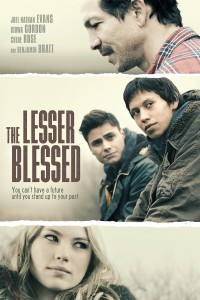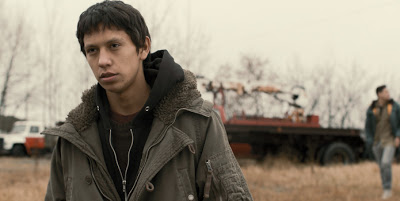The Lesser Blessed
The Lesser Blessed is a film depicting the story of Larry, a 16-year-old Tlicho Indian that lives with his mother in the Northwest Territories. His past comes to surface throughout the film, displaying an abusive father and a fire that killed his dad and almost took his life too. Like most boys at his school, he has a crush on a Juliet, the most attractive girl that the school. Larry consistently gets bullied by one boy in particular, Darcy, and finds it difficult to fit in because of it. A new student, Johnny, befriends Larry, as he himself is Métis.
There were so many questions coming to mind throughout and following the film.
- How much of the plot was realistic and how much was Hollywood?
- Where was the parental involvement?
- What affect does all of this have on the teenagers?

1) How much of the plot was realistic and how much was Hollywood?
There were so many outrageous, and almost sad, moments throughout the movie, strictly based on the fact that I was unsure how much was “for the movie”. The main scene that triggered this question for me was during the student “slave auction”. Not only is this extremely offensive, but it was supported by teachers. The one teacher went so far as to bid on a student, giving the perception that the event was endorsed by adults and authority figures. I would hope that this would never happen in a school nowadays, especially with all of the inclusion, anti-bullying, and accepting schools legislature being implemented.

2) Where was the parental involvement?
All I can say is that there would have been words had my actions as a 16-year-old even remotely resembled those of Larry and his peers. There were so many concerning elements of these teenagers lives: mental health (specifically Larry’s PTSD), aggression, illicit drugs, mass alcohol consumption, unsafe sex… And yet the parents only seemed to have a voice when they were kicking their child or their friends out of the house. What kind of message does this send the teenagers? Can the kids be solely responsible for their actions if the parents have had little involvement in preventing the actions?

3) What affect does all of this have on the teenagers?
I think Larry was the definition of being numb; he rarely showed emotion, good, bad or otherwise. Perhaps due to him trying to keep his father’s abuse and death a secret, Larry resorted to internalizing his emotions. As expected, these emotions surfaced in negative bursts, such as when he attacked Darcy or when he ran away from home. I will say, the truest words in the entire film were the last we heard from Johnny:
“I’m just a kid, Larry.”
As with any life story, we know that there are troubles in our past and turmoil in our present, but it is important to look forward and make the absolute best of any situation we are given. We are the ones who decide how our lives will turn out, and for that reason, we must remain positive. As Larry says:
“I cry knowing that I don’t belong to anyone. But I smile too, knowing that my life is still unwrapped.”

For sure this film represents some issues of living for Indigenous youth that is difficult to imagine!
“Don’t think someone else is more blessed than you are, it’s just that we are blessed in different ways.” I love that you ended your post with this saying 🙂 I struggled with this title, but it is true, living on a reservation is not glamorous not inherently spiritual, but I wouldn’t change it for anything. I think we need to learn and acknowledge the more positive aspects of aboriginal culture.